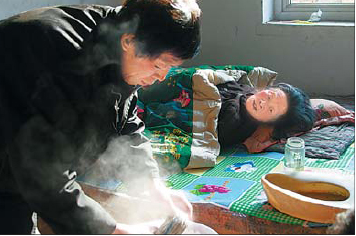Laborers vulnerable to rogue job agencies
Meng Fanxing, 47, of Ruigu village, also said he injured his left leg while working on the supermarket project and is now partially disabled. His family, which includes his paralyzed 83-year-old mother, now survives on just 1,000 yuan a month, which his wife makes working in the city of Cangzhou.
|
Meng helps care for his paralyzed mother at home in Gucheng county, Hebei province. |
"My two daughters both study and I was hoping to spend the money I earned in Romania on their education. I didn't think I'd come back poorer than when I went," he said.
Gucheng Shunda Labor Information Consultation Co Ltd has publicly denied the charges made by the workers. A spokesman declined to comment further when contacted by China Daily.
The Chinese workers arrived in Bucharest in April 2008 and at first things went smoothly, although they often worked overtime, said Li. But in July they received notice from the Romanian Immigration Bureau that their visas had expired and were told to leave the country within 15 days.
"Until then we never realized our visas were not the right type. They were temporary permits valid for only 90 days," said Fang Zhenggang, who was part of the group. They continued to work on the construction project as illegal immigrants, running the risk of being arrested and deported, he said. "We couldn't just go back or that would mean the 80,000 yuan had been wasted."
Disaster also struck when in January 2009 the Chinese workers were evicted from their free accommodation. They were forced to find shelter in transport containers and cowsheds, all the time dodging the Romanian police, and ate soiled vegetables thrown out by locals. They celebrated last Spring Festival at the Chinese Embassy. "We had dumplings that night. It was the best food we had eaten in months," said Fang.
In late February, Gucheng county officials arrived to fly them home to China.
"The intermediate agency does not have a certificate to give out work visas," said attorney Ping. "They not only used temporary visas to cheat the workers and made false promises about the salaries they would get, but also overcharged on intermediary fees."
 0
0 








Go to Forum >>0 Comments